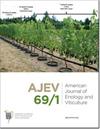不同营养指标校准近冠层传感器与葡萄修剪重量的比较
IF 1.8
3区 农林科学
Q3 BIOTECHNOLOGY & APPLIED MICROBIOLOGY
引用次数: 5
摘要
葡萄栽培中的冠层感应与术语NDVI(归一化差异植被指数)广泛相关。然而,还有许多其他植被指数(VI)可以根据用可见光/近红外(NIR)传感器捕获的信息来计算。近端树冠传感器用于调查伊利-康科德湖带的27个葡萄园,并分层收集每个葡萄园约25个样本的修剪重量(PW)。从传感器数据中导出七个VI,并且从七个VI的主成分分析中提取第一主成分(PC1)。根据局部PW测量值对VI和PC1进行回归,并根据其拟合优度进行排序。在27个葡萄园中,没有一个VI的表现优于其他葡萄园,尽管使用红边带的VI比使用红带的VI稍有优势。因此,在根据陆地近端冠层调查预测PW时,建议使用归一化差异红边指数(NDRE)代替NDVI。与单一VI方法相比,从所有七个VI的分解中得出的PC1似乎确实为PW预测带来了一些好处,尤其是仅使用NDVI。建议对多元方法的潜力进行更多的研究。本文章由计算机程序翻译,如有差异,请以英文原文为准。
Comparison of Different Vegetative Indices for Calibrating Proximal Canopy Sensors to Grapevine Pruning Weight
Canopy sensing in viticulture is widely associated with the term NDVI (normalized difference vegetation index). However, there are many other vegetative indices (VIs) that can be calculated from information captured with visible/near-infrared (NIR) sensors. A proximal canopy sensor was used to survey 27 vineyards in the Lake Erie Concord belt and stratified to collect pruning weights (PW) at a density of ~25 samples per vineyard. Seven VIs were derived from the sensor data and the first principal component (PC1) extracted from a principal components analysis of the seven VIs. The VIs and PC1 were regressed against the local PW measurements and ranked in terms of their goodness-of-fit. Over the 27 vineyards, there was no single VI that outperformed the others, although VIs that used the red-edge band had a slight advantage over VIs using the red band. It is therefore recommended to use the normalized difference red edge index (NDRE) in place of the NDVI when predicting PW from terrestrial-based proximal canopy surveys. The PC1 derived from the decomposition of all seven VIs did appear to convey some benefit to PW prediction compared with a single VI approach, particularly with just NDVI. More research into the potential for multivariate approaches is recommended.
求助全文
通过发布文献求助,成功后即可免费获取论文全文。
去求助
来源期刊

American Journal of Enology and Viticulture
农林科学-生物工程与应用微生物
CiteScore
3.80
自引率
10.50%
发文量
27
审稿时长
12-24 weeks
期刊介绍:
The American Journal of Enology and Viticulture (AJEV), published quarterly, is an official journal of the American Society for Enology and Viticulture (ASEV) and is the premier journal in the English language dedicated to scientific research on winemaking and grapegrowing. AJEV publishes full-length research papers, literature reviews, research notes, and technical briefs on various aspects of enology and viticulture, including wine chemistry, sensory science, process engineering, wine quality assessments, microbiology, methods development, plant pathogenesis, diseases and pests of grape, rootstock and clonal evaluation, effect of field practices, and grape genetics and breeding. All papers are peer reviewed, and authorship of papers is not limited to members of ASEV. The science editor, along with the viticulture, enology, and associate editors, are drawn from academic and research institutions worldwide and guide the content of the Journal.
 求助内容:
求助内容: 应助结果提醒方式:
应助结果提醒方式:


